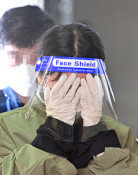[Opinion] Frontal Lobe Man
In an academic conference in London in 1935, American neurophysiologist John Fulton said he tamed a violent monkey by eliminating part of its brains frontal lobe. Portuguese neurologist Egas Moniz, who was impressed by Fultons study, applied the method to patients suffering from schizophrenia and paranoia. Those who got the treatment grew gentle immediately. For this feat, Moniz and his colleague, Swiss neurophysiologist Walter Rudolf Hess, won the 1949 Nobel Prize for medicine.
The patients who underwent this treatment, however, suffered from a weird problem. Though their memory ability remained intact, their judgment was clouded. They were impressed by nothing, became compulsive, and lost enthusiasm. Despite these side effects, the procedure was continued and recklessly applied to World War II soldiers who had become mentally unstable from combat. Until the mid-1950s, more than 40,000 people in the United States alone got the surgery. The frontal lobe has no impact on a persons survival, but turned out to be a crucial component for a human being, something which scientists discovered much later.
The book Frontal Lobe Man by Na Deok-ryeol, a neurology professor at Samsung Medical Center in Seoul, is grabbing headlines. Na says that just as a country or company has a CEO, the human brains CEO is the frontal lobe. Stressing the importance of the frontal lobe based on his experience, he said failure of the frontal lobe causes compulsive gambling, sex addiction, testiness, voyeurism and overeating.
In contrast to a frontal lobe person, other people have the rear part of their brains, or occipital lobe, more developed. The occipital lobe is responsible for feelings such as joy, anger, sorrow and happiness. Its functions stand out in adolescents. Teenagers can be physically similar to adults, but their frontal lobes are not fully developed. If teens are not enthusiastic or interested in study, one recommendation is to provide them with an environment that can stimulate their frontal lobe instead of scolding them. To develop the frontal lobe, Na suggests that parents turn off the TV and read newspapers or books.
Editorial Writer Chung Sung-hee (shchung@donga.com)







